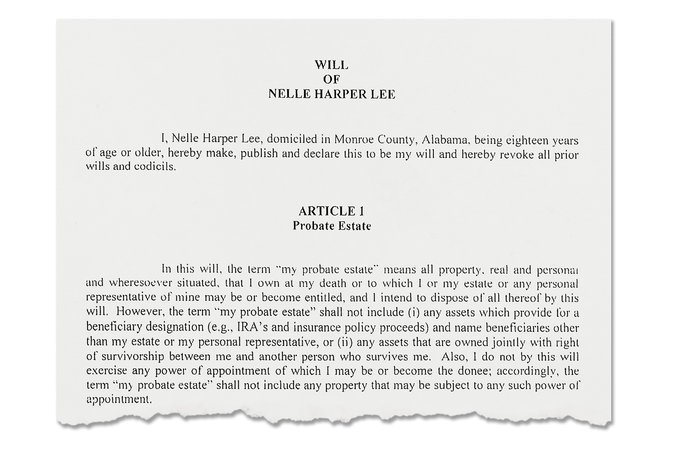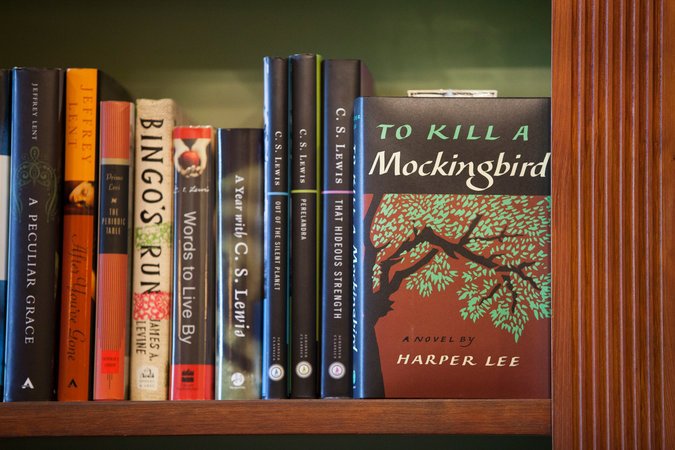It is also unclear how the will differed from any prior document Ms. Lee may have created to distribute her assets.

Ms. Lee never married or had children, and the court papers identified her heirs and closest living relatives as a niece and three nephews, who are expected to receive an undisclosed portion of the estate through the trust.
The will named Tonja B. Carter, Ms. Lee’s longtime lawyer, as the executor, or personal representative, of the estate, and it provided her with wide-ranging powers to shepherd Ms. Lee’s literary legacy and the rest of her assets.
Ms. Carter had gone to court in 2016 to successfully persuade Probate Judge Greg Norris of Monroe County to seal the will, citing Ms. Lee’s desire for privacy. And while the estate had stressed in court papers that making the will public could lead to the “potential harassment” of individuals identified in it, the document itself is strikingly opaque.
It was unsealed Tuesday on the basis of a lawsuit filed by The New York Times seeking to review the document. Lawyers for The Times argued that wills filed in a probate court in Alabama are typically public records, and that Ms. Lee’s privacy concerns were no different from those of others whose wills are processed through the court system.
“It’s a public record, and the press and the public have a right to public records,” said Archie Reeves, the lawyer who represented The Times.
Last week, as both sides prepared to depose witnesses, the estate withdrew its opposition to making the will public. It did not disclose its reasoning.
Advertisement
Continue reading the main story
The document’s lack of transparency will likely fuel skepticism among those who feel that Ms. Carter had amassed too much power over Ms. Lee’s career and legacy. The will gives Ms. Carter substantial control over Ms. Lee’s estate and her literary properties, which are assigned to the Mockingbird Trust, an entity that was formed in 2011. Ms. Carter served as one of its two trustees at the time.

“It is not an uncommon will, and it is typically what we term a pour-over will where anything in the estate goes over to the trust and they don’t have to disclose the terms of the trust,” said Sidney C. Summey, an estate and trusts lawyer in Birmingham.
“It is done quite often by people of means, people with notoriety and people who just want to be private,” Mr. Summey said.
Ms. Lee’s relatives had supported efforts to seal the will. Phone calls to reach several members of her family were unsuccessful.
As a personal representative, Ms. Carter is entitled to compensation for her work. The will allows the personal representative to earn additional fees as part of an organization, like a law firm, that does work for the estate.
Ms. Carter declined to discuss the will, citing Ms. Lee’s penchant for privacy. “I will not discuss her affairs,” she said.
One of the two witnesses to the will, Cynthia McMillan, a former resident assistant who had helped care for Ms. Lee at a facility where she had lived, said in an interview that Ms. Lee seemed cogent when she signed it. “In my opinion, she was,” Ms. McMillian said.
The estate was built largely on the outsize and enduring success of Ms. Lee’s Pulitzer Prize-winning debut novel, “To Kill a Mockingbird,” which since its publication in 1960, has sold more than 40 million copies worldwide and remains a staple on American school curriculums. In addition, “Go Set a Watchman,” her second novel, was the best-selling book of 2015 in the United States, and sold more than 1.6 million hardcover copies, according to NPD BookScan.
Harper Lee, 1926- 2016
Harper Lee, whose first novel, “To Kill a Mockingbird,” about racial injustice in a small Alabama town, sold more than 40 million copies, died at the age of 89.
By JOHN WOO, NEIL COLLIER and MONA EL-NAGGAR on Publish Date February 19, 2016. Photo by Donald Uhrbrock/The LIFE Images Collection, via Getty Images. Watch in Times Video »
“Mockingbird” alone sells more than a million copies a year worldwide, generating some $3 million in royalties for the copyright holder, according to court documents.
Advertisement
Continue reading the main story
Ms. Lee had always lived simply, despite her fame and mounting wealth, and long shared a modest brick home in Monroeville with her older sister, Alice, who died in 2014. Ms. Lee could be seen around town in sweatpants looking for bargains at a Dollar General Store, washing her clothes at a local Laundromat, drinking coffee at a McDonald’s or eating at David’s Catfish House, where her usual iced tea and a small plate of catfish would cost about $6.
Often miscast as reclusive, she was no hermit, but she was as ferociously private as she was famous, and shunned interviews.
Newsletter Sign Up
Continue reading the main story
Thank you for subscribing.
An error has occurred. Please try again later.
You are already subscribed to this email.
She was thrust into the spotlight three years ago, when “Watchman” was released. Its publication sparked a debate about whether or not Ms. Lee had been pushed into publishing the novel, one that she had abandoned in the 1950s as an early effort at the story that would become “Mockingbird.”
At the release of “Watchman,” there were already questions about Ms. Lee’s vulnerability and her mental and physical condition. She had suffered a stroke in 2007, had severe vision and hearing problems and had moved into an assisted living facility. In 2013, in a copyright dispute that went to court, Ms. Lee’s lawyers said she had been taken advantage of and coerced into signing away her copyright because she was “an elderly woman with physical infirmities that made it difficult for her to read and see.”
The controversy surrounding “Watchman” divided Ms. Lee’s hometown, pitting some of her longtime friends and acquaintances, who doubted she had approved of the publication, against Ms. Lee’s lawyer, agent and publisher, generating the kind of public spectacle Ms. Lee abhorred. But an Alabama agency investigated whether Ms. Lee was a victim of elder abuse and financial fraud and determined that no abuse had occurred.
Some scholars and fans embraced “Watchman” as a long awaited sequel to Ms. Lee’s debut work, while others dismissed it as an inferior rough draft, one that was eventually polished and reshaped into a masterpiece. Many fans were shocked to discover that Atticus Finch, the crusading lawyer who fights for racial equality in “Mockingbird,” is depicted in “Watchman” as an aging racist and segregationist who clashes with his daughter, a grown-up Scout, over her support for civil rights.

Ms. Carter emerged as polarizing figure in the debate. She was at first credited with recovering Ms. Lee’s long lost novel, and recounted how she discovered the manuscript for “Watchman” in a safe deposit box in the summer of 2014. But others disputed that account and said Ms. Carter had been present when the manuscript was discovered in October 2011 during an appraisal by a rare books expert. The appraiser had come to inspect what was thought to be a “Mockingbird” manuscript, and Ms. Carter later said she had not realized at the time that actually a different manuscript had been reviewed.
Still, many viewed Ms. Carter as Ms. Lee’s staunchest protector, and with a coterie of friends from the area, she is now helping to expand Ms. Lee’s literary legacy.
Advertisement
Continue reading the main story
Ms. Carter helps run a nonprofit, Mockingbird Company, that Ms. Lee created in 2015. It puts on a dramatization of “Mockingbird” in Monroeville each year.
A different production, drawn from the novel and scripted by Aaron Sorkin, is headed for Broadway this year. A “Mockingbird” graphic novel, adapted by Fred Fordham, was approved by Ms. Lee’s estate and will be published in the fall. And there are new plans for the Harper Lee Trail, which local officials hope will attract hundreds of thousands of tourists a year to Monroeville. Planned attractions include a museum dedicated to Harper Lee and replications of characters’ houses in “To Kill a Mockingbird.”
How this all would have sat with Ms. Lee also remains a matter of debate. She took pains to protect her intellectual property and often scorned attempts to commercialize her novel. In 2013, she sued a local museum, arguing that it had infringed on her trademark by selling “Mockingbird” themed T-shirts and trinkets (the suit was settled in 2014).
And in a letter to a friend in 1993, she complained that Monroeville was turning into a “Mockingbird” tourist attraction. She expressed particular irritation at the strangers lingering in front of her house.
“They came in VANS,” she wrote.
Continue reading the main story
Article source: https://www.nytimes.com/2018/02/27/books/harper-lee-will.html?partner=rss&emc=rss
Speak Your Mind
You must be logged in to post a comment.